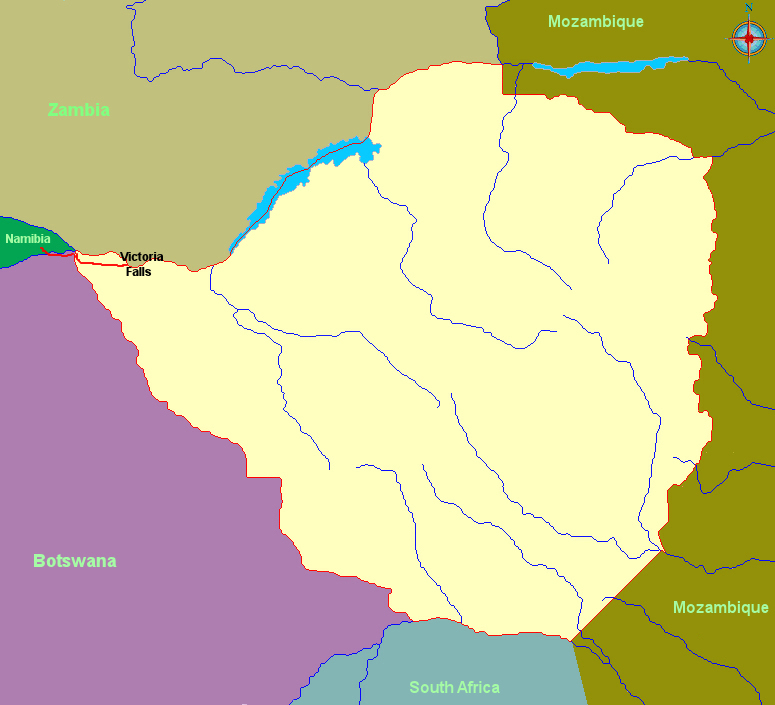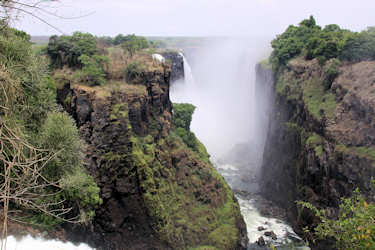Zimbabwe

Historie
Sometime between 200-500 AD, the Bantu-speaking people who were living in the Katanga area (today
part of the Democratic Republic of the Congo and Zambia) crossed the Limpopo River, entering the area today known
as Botswana/South Africa as part of the Bantu expansion.
The Bantu-speaking society was highly a decentralized feudal society organized on a basis of kraals (an enlarged
clan), headed by a chief, who owed a very hazy allegiance to the nation's head chief.
The Kingdom of Mapungubwe (1075–1220) was the first in a series of sophisticated trade states developed in
Zimbabwe. From about 1250 until 1450, Mapungubwe was eclipsed by the Kingdom of Zimbabwe
The capital Great Zimbabwe was a majestic ancient stone city that flourished on the strength of a powerful
and organised society. It thrived on the foundation of favourable agricultural conditions, cattle-keeping,
great mineral wealth and most significantly, both regional and long distance trade.
Trade was conducted with such far away areas as China, India, the Middle East and the Near East, East and West Africa,
among other regional and inter-regional areas. Persian bowls, Chinese dishes, Near Eastern glass and other such items
have been excavated at Great Zimbabwe, signifying the trade contacts with these far away places.
The period of prosperity at Great Zimbabwe was, however, followed by decline and abandonment due to shortages of
food, pastures and natural resources in general and by the late 15th century, Great Zimbabwe had completely lost its
wealth, trade, political and cultural importance. Today, Great Zimbabwe is preserved as a valuable cultural centre
and tourist attraction.
Although Portuguese Missionaries and traders occasionally make their way inland from the coast, they have little
effect on the African tribes living in the region of modern Zimbabwe. It is Europeans from southern Africa who later
exert a profound influence.
In the last quarter of the 19th century the driving force behind British colonial expansion in Africa is Cecil
Rhodes. He arrives in Kimberley at the age of eighteen in 1871, the very year in which rich diamond-bearing lodes
are discovered there. He makes his first successful career as an entrepreneur, buying out the claims of other prospectors
in the region.
Rhodes is now rich beyond the reach of everyday imagination, but he wants this wealth for a very specific purpose. It
is needed to fulfil his dream of establishing British colonies north of the Transvaal, as the first step towards his
ultimate grand vision - a continuous strip of British Empire from the Cape to the mouth of the Nile.
The first step north towards the Zambezi has considerable urgency in the late 1880s. It is known that the Boers of
the Transvaal are interested in extending their territory in this direction. In the developing scramble for Africa
the Portuguese could easily press west from Mozambique. So could the Germans, who by an agreement of 1886 have been
allowed Tanganyika as a sphere of interest.
After gaining mining rights in 1888 Rhodes sends the first party of colonists north from Bechuanaland in 1890. In
september they settle on the site which today is Harare and begin prospecting for gold. In support of Rhodes's scheme,
the government declares the area a British Protectorate in 1891.
On 12 September 1923 (thirty-three years to the day after the arrival of the first settlers at Harare) Rhodesia becomes
a self-governing crown colony.
After a brief federation with Northern Rhodesia (now Zambia) and Nyasaland (now Malawi) in the post–World War II
period, Southern Rhodesia (also known as Rhodesia) chose to remain a colony when its two partners voted for
independence in 1963.
From 1960 onwards, major contradictions developed between colonial policy in London, which now wanted change, and
the Rhodesian administration, which opposed majority rule, resulting in the Unilateral Declaration of Independence
(UDI) of 1965 by the Rhodesian Prime Minister, Ian Smith. Despite judgments by the highest courts in Rhodesia
and England that the rebellion was illegal and treasonous, the British government refused to send troops to quell
the rebellion, but imposed economic sanctions, which were to last for fourteen years.
Zimbabwe emerged as an independent state on 18th April 1980 with Robert Mugabe as Prime Minister and
Canaan Banana as ceremonial President. Elections in March 1990 resulted in another overwhelming victory for Mugabe
and his party, which won 117 of the 120 election seats.
Although many whites had left Zimbabwe after independence, mainly for neighbouring South Africa, those who remained continued to
wield disproportionate control of some sectors of the economy, especially agriculture. In the late-1990s whites accounted for less than
1% of the population but owned 70% of arable land.
Mugabe raised this issue of land ownership by white farmers. In a calculated move, he began forcible land redistribution.This has led to a
mass migration of White Zimbabweans out of Zimbabwe. At present almost no arable land is in the possession of white farmers.
In November 2017, the army led a coup d'état following the dismissal of Vice-President Emmerson Mnangagwa, placing Mugabe under house
arrest. Mugabe resigned on 21 November 2017, after leading the country for 37 years.
Emmerson Mnangagwa has served as President of Zimbabwe since 24 November 2017.
I visited Zimbabwe in november 2014
It was part of my Cape Town - Victoria Falls trip
On that trip i have seen
Victoria Falls
Please let me know when you're having questions.
i would be pleased to help you.
Things to do and other tips
